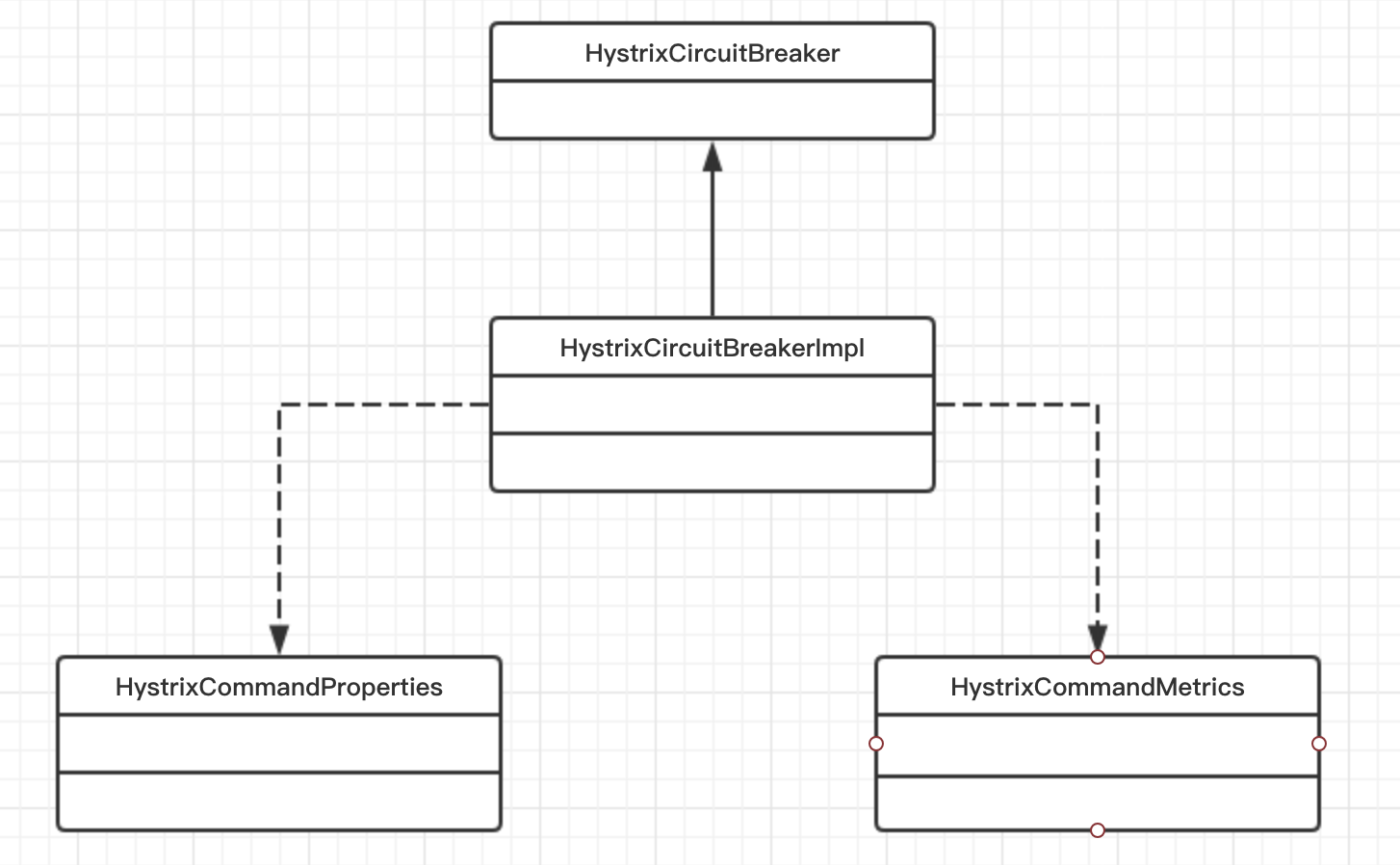讲完metrics我们就来了解一下熔断器的执行情况,熔断器的判断取决metrics数据。
hystrix在执行命令前需要经过熔断器判断,如果服务被熔断,则执行fallback流程,熔断判断逻辑如下:
- 如果强制未开启,返回true(未熔断)。
- 如果强制开启,返回false(熔断)。
- 判断熔断标识
- 如果未熔断则返回true。
- 如果half_open,返回false(熔断)。
- 如果熔断,判断当前时间是否超过短路窗口期,
- 如果没有超过,返回false。
- 如果超过则返回true。 并设置熔断状态为half_open。
命令执行失败后逻辑如下:
如果熔断标识为half_open,并重新计算短路窗口期(记录当前时间)。
如果熔断标识为close,通过命令metric组件,获取命令指定窗口时间内执行总错误数和错误率。如果实际错误率或错误数高于配置错误率或错误数,则设置熔断标识为熔断。
命令执行成功后逻辑如下:
只有在熔断状态为half_open状态下,才能解除熔断。
如果请求执行成功,解除熔断。
熔断器还会监听metrics数据流,当错误比率或者请求量大于配置的值时,就会设置熔断标识为熔断。每个commandkey都会对应一个熔断器。

熔断器判断
private Observable<R> applyHystrixSemantics(final AbstractCommand<R> _cmd) { ... if (circuitBreaker.allowRequest()) { ... return executeCommandAndObserve(_cmd) .doOnError(markExceptionThrown) .doOnTerminate(singleSemaphoreRelease) .doOnUnsubscribe(singleSemaphoreRelease); ... } else { return handleShortCircuitViaFallback(); } }
熔断器逻辑
static class HystrixCircuitBreakerImpl implements HystrixCircuitBreaker { private final HystrixCommandProperties properties; private final HystrixCommandMetrics metrics; /* track whether this circuit is open/closed at any given point in time (default to false==closed) */ private AtomicBoolean circuitOpen = new AtomicBoolean(false); /* when the circuit was marked open or was last allowed to try a 'singleTest' */ private AtomicLong circuitOpenedOrLastTestedTime = new AtomicLong(); protected HystrixCircuitBreakerImpl(HystrixCommandKey key, HystrixCommandGroupKey commandGroup, HystrixCommandProperties properties, HystrixCommandMetrics metrics) { this.properties = properties; this.metrics = metrics; } public void markSuccess() { if (circuitOpen.get()) { if (circuitOpen.compareAndSet(true, false)) { //win the thread race to reset metrics //Unsubscribe from the current stream to reset the health counts stream. This only affects the health counts view, //and all other metric consumers are unaffected by the reset metrics.resetStream(); } } } @Override public boolean allowRequest() { if (properties.circuitBreakerForceOpen().get()) { // properties have asked us to force the circuit open so we will allow NO requests return false; } if (properties.circuitBreakerForceClosed().get()) { // we still want to allow isOpen() to perform it's calculations so we simulate normal behavior isOpen(); // properties have asked us to ignore errors so we will ignore the results of isOpen and just allow all traffic through return true; } return !isOpen() || allowSingleTest(); } public boolean allowSingleTest() { long timeCircuitOpenedOrWasLastTested = circuitOpenedOrLastTestedTime.get(); // 1) if the circuit is open // 2) and it's been longer than 'sleepWindow' since we opened the circuit if (circuitOpen.get() && System.currentTimeMillis() > timeCircuitOpenedOrWasLastTested + properties.circuitBreakerSleepWindowInMilliseconds().get()) { // We push the 'circuitOpenedTime' ahead by 'sleepWindow' since we have allowed one request to try. // If it succeeds the circuit will be closed, otherwise another singleTest will be allowed at the end of the 'sleepWindow'. if (circuitOpenedOrLastTestedTime.compareAndSet(timeCircuitOpenedOrWasLastTested, System.currentTimeMillis())) { // if this returns true that means we set the time so we'll return true to allow the singleTest // if it returned false it means another thread raced us and allowed the singleTest before we did return true; } } return false; } @Override public boolean isOpen() { if (circuitOpen.get()) { // if we're open we immediately return true and don't bother attempting to 'close' ourself as that is left to allowSingleTest and a subsequent successful test to close return true; } // we're closed, so let's see if errors have made us so we should trip the circuit open HealthCounts health = metrics.getHealthCounts(); // check if we are past the statisticalWindowVolumeThreshold if (health.getTotalRequests() < properties.circuitBreakerRequestVolumeThreshold().get()) { // we are not past the minimum volume threshold for the statisticalWindow so we'll return false immediately and not calculate anything return false; } if (health.getErrorPercentage() < properties.circuitBreakerErrorThresholdPercentage().get()) { return false; } else { // our failure rate is too high, trip the circuit if (circuitOpen.compareAndSet(false, true)) { // if the previousValue was false then we want to set the currentTime circuitOpenedOrLastTestedTime.set(System.currentTimeMillis()); return true; } else { // How could previousValue be true? If another thread was going through this code at the same time a race-condition could have // caused another thread to set it to true already even though we were in the process of doing the same // In this case, we know the circuit is open, so let the other thread set the currentTime and report back that the circuit is open return true; } } } }